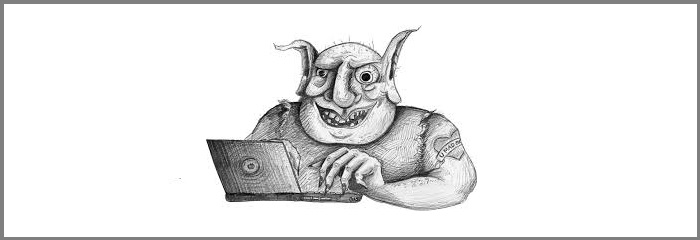Those who keep an eye at this blog surely noticed that lately I publish less frequently, and that the posts have become longer and more “serious”. This change of direction is not casual, but it’s a consequence of a series of evaluations that I made on what I want that this blog is, and on the strategy that I want to follow to spread its contents.
To delete or not to delete?
If I take a look and what I was publishing until just a little time ago, I admit that I feel my skin crawling. And not only here on the blog, but in general on internet: I wrote and said a lot of stupid, superficial or meaningless things, I commented on articles/videos of other people with hate, racism, sarcasm, ego. I went through all the stages of stupidity -I didn’t miss a single one- and now I recognize them in all those stupid things that I published in the past.
The first that comes to my mind is a video on Youtube where I discussed the nonsense of the schooling system in Italy, in which the main point was that in my opinion they make the students study for too many hours, and also often they make them memorize too many useless notions. I still agree with many of the points that I made in that video, but in a portion of it I included, among the “useless” subjects, philosophy. And this today seems crazy to me, because now I consider philosophy as one of the most important things to teach to the students.
In a similar way, I changed my mind on many other things, and the temptation of deleting many of the stupid things published in the past is strong, but I still resist. After all, where to place the bar above which “it’s good”? Which articles and videos that I published are good enough to be left on the internet, and which ones are under the threshold of tolerance? Making this cleaning would give me too much the temptation to leave online only very few things that I consider “high level”, and would be dangerous because it would feed my perfectionism.
In addition, I re-read the stupid and superficial things that I published in the past with some affection, because they remind me the journey I had to get here.
Often I listen to and read the ideas of many people who produce contents on internet, people that I like and follow, and they seem so damn wise, intelligent and full of love to me, that I really can’t imagine that those people have ever gone through all this stupidity to get to that stage of “evolution”. I almost tend to think that they have always been, more or less, like this.
But I haven’t. Not that now I consider myself particularly wise, intelligent or full of love, but at least it seems to me that I am much more mature than I was until few years ago. I changed a lot in these last years, a change that definitely has not been painless, but I’m quite proud of it. And yet it happened making all the possible and imaginable mistakes, none excluded.
There’s still room for mistakes and stupid things
Obviously, there’s nothing to worry about: I’ll probably keep on producing tons of mistakes and stupid things. I imagine that in the future I will read the things that I write in this period and I will think “how couldn’t I see that it was stupid!” or “how did the hell came to my mind to publish that idiocy!”.
And I don’t even have the intention of banning every superficial topic from the blog, and write only about deep and serious topics, it sounds quite boring. The ability to span from topics like spirituality and economy, to topics like The human centipede and Two girls one cup*, that’s one of the things that I appreciate more about my personality. I tried to explain this trait of my character in the post Inseparable emotions. In addition, often the superficial topics are great base material to develop funny posts or videos, that make people laugh. And laughing and make people laugh is definitely one of the missions of my life.
However, there’s the fact that I decided to change the approach to what I publish (and how I publish it) here on the blog and on the various internet sites that are related, as soon as I clarified in my head some things. First of all:
What I want that this blog is
Understanding what I wanted this blog to be has been a very gradual process, that required a lot of time. That I wanted a space to give voice to all my “theories”, those I punctually stalk my friends and relatives with, this was obvious already many years ago. Just like it was obvious that the main theme of the blog is exactly me: my ideas, my opinions, my vision of the world. So it was immediately evident that the domain name to use was my own name: Paolo
Another couple of aspects, instead, became clear only after much more time, but today finally I’m quite sure about these too.
First of all, I want that this blog is a tool to produce beauty. To deliver interesting, original, useful ideas, that can improve the life of people. And this is the motivation why I spend hours to write articles and to produce videos on topics that I consider “important”, making an effort to describe the ideas with clarity and simplicity.
I also want that this blog is a personal journal, in which I can write, alternating them to the articles of general interest, the experiences of my own life. What happens to me, the people I meet, the places I explore, the situations I am in during my days, and what I think I learn from all of this. I like to keep on the blog a record of my personal development journey.
And I want that this blog is something that really corresponds to me. I want to open it and find myself in a space that really feels like me: from the graphic design, to the articles, the videos, the music: something that is original, authentic, talented, tormented, comic. It’s easier written than done, obviously, but this is the goal at least.
The strategy
Finally there’s the theme of what strategy to follow, that explains why in the last period the posts are rather infrequent, but pretty long.
The reason is simple: I don’t want to dilute the contents. Until little time ago I thought that there was nothing wrong in publishing both serious posts, coming from a lot of thinking, and also casual updates about the latest news, or superficial things, just for fun. And in fact that’s what I was doing.
But then I realized that by doing this I dilute the effectiveness of the messages that I include in those serious posts, those that come from a lot of thinking. And considered that today the internet is flooded daily with contents of little value -every day millions of new articles, video, news appear on the web, for the vast majority meaningless- it doesn’t make any sense to try to keep the pace and publish contents with high frequency as well just “to retain the interest”. Competing on quantity, it doesn’t seem to make too much sense anymore.
My consideration is that now the mass of contents produced by the humanity is enormous, I would almost say excessive, and this can be seen both in the internet, where most of the meaningless contents are published and ignored, falling in the oblivion of internet and basically “disappearing” from the search engines, but also in the real world, for example in the book stores, where new books appear on the shelves with very fast rhythms, often just to sell few copies and then disappear for the sight as well.
The best strategy is still, in my opinion, to compete on quality. This still makes a lot of sense. Even if I publish new articles and videos more rarely, it their contents are “strong”, people will search for them and reach them. And I want people to know that when they reach my blog, they will find high quality contents inside, without having to skim through other meaningless posts published just to publish something.
Of course, from time to time I still feel like writing thoughts about superficial topics or commenting the latest news, and fortunately there are the social networks for this. When I want to publish something of little value, or share non original contents -so produced by other people- I can simply do that on the social networks. People on social networks don’t want to absorb ideas or contents anyway, but they just go there to browse “easy” contents in a quick and superficial way, contents that don’t provoke any thought.
This blog instead is the best destination for those that I consider my best ideas. It seems obvious now, but I had to publish a certain amount of stupid posts on it before understanding this.
So until the next evaluation, the strategy will be this: keep the contexts separated, and pay more attention to quality than on quantity.
Notes: * in case you never heard about them, they are two quite popular movies with the same lead actor: human feces.
Related:


























